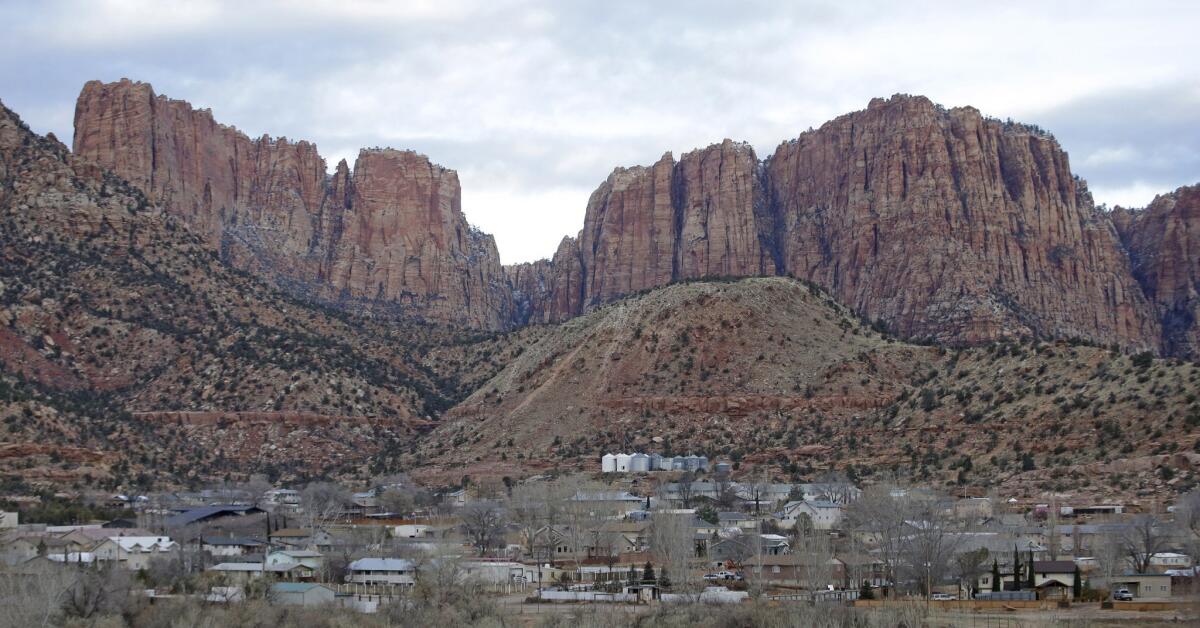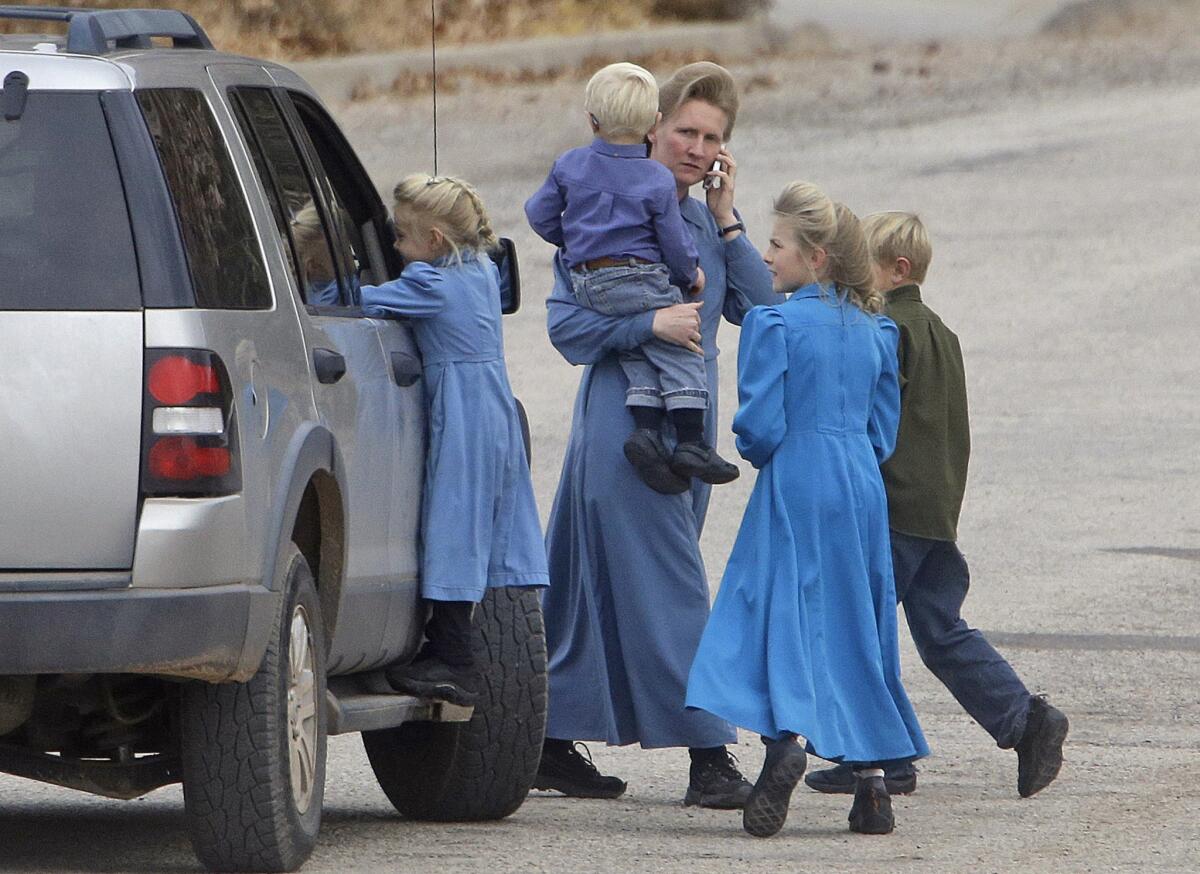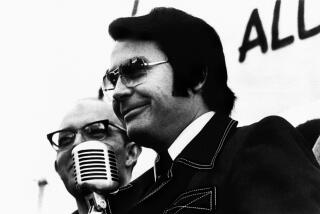Towns run by a polygamist sect discriminated against nonbelievers, jury finds

Hildale, Utah, sits at the base of Red Rock Cliff mountains, with its sister city, Colorado City, Ariz., in the foreground.
Reporting from PHOENIX — Two border towns run by a polygamist sect violated the constitutional rights of nonbelievers, a jury decided Monday after a dramatic seven-week trial that included testimony from people who said they were denied basic utilities like water and harassed by the local marshal’s office.
The verdict in the civil trial could have far-reaching implications for the twin towns of Hildale, Utah, and Colorado City, Ariz. Each is run by members of the Fundamentalist Church of Jesus Christ of Latter-Day Saints, and though town leaders had pledged improvements, trial evidence suggested they simply modernized their exclusionary practices instead.
U.S. District Judge H. Russel Holland now will hear from the cities and Justice Department on what should be done to fix the violations. Such civil rights trials have been used to force change in police departments of major cities, but rarely has an entire city — including the mayor’s office — been the possible subject of federal oversight and management.
In the case of Hildale and Colorado City, the burden would be spread between the neighboring cities.
The Justice Department alleged that the leadership of the towns is beholden to Warren Jeffs, the religion’s prophet imprisoned for life for child sexual assault. While the trial was unfolding in a Phoenix courtroom, federal agents arrested 11 people on suspicion of food stamp fraud in Hildale and Colorado City.
During the trial, the government alleged that leaders of the towns — which make up the 10,000-person church stronghold known as Short Creek — discriminated against nonbelievers by denying them water service and delaying police response to emergencies.
Because the government prevailed, police and government services could be handed over to a receivership that answers to the federal government, but the government hasn’t said what relief it will seek.
Phoenix defense attorney Jeffrey Matura, who represented the towns with co-counsel Blake Hamilton, said before the verdict was read that he would be ready to explore “all avenues of appeal” if the jury found against the cities.
Hamilton and Matura said during trial that the towns were victims of a deep-seated desire by the U.S. government to extinguish the religion and its way of life. The cities and their shared water utility denied the allegations of discrimination and say they have distanced themselves from Jeffs.
During turbulent times in the last decade, when a then-fugitive Jeffs was hunted down, tried and convicted, the cities had different leadership and a different police chief. After investigations into their conduct, town police officers were decertified by the Arizona and Utah police registry agencies and then given government or church positions.
But since 2007, Hamilton said, no officers have lost their certification, and the current leadership of the towns’ collective police department is not accused of having done anything improper.
The sect is not affiliated with the Church of Jesus Christ of Latter-day Saints, the formal name of the Mormon Church, which banned polygamy in 1890, though plural marriages remained a custom through the 1930s, when Mormons began to excommunicate those who took multiple wives.
At the time, sect members seeking freedom to practice polygamy, which they believe guarantees their entry to heaven, founded Short Creek in response.
Today, Hildale and Colorado City operate as independent municipalities, each with a mayor and five-member town council, though most of the land in each is held by the United Effort Plan Trust, a sect-controlled fiduciary collective.
Hamilton and Matura were prepared for some of their witnesses to invoke their 5th Amendment rights and decline to answer questions, and told the jury as much in their opening statement.
But they could not have predicted the way those witnesses would respond to questions on the stand, nor the effect it would have on the jury, in particular the testimony of Joseph Steed Allred, mayor of Colorado City.

People walk along a street in 2014 in Hildale, Utah, a city once run by polygamist leader Warren Jeffs.
Allred took the stand Feb. 9, about halfway through the trial. In a series of dismissive replies about his multiple wives, their ages and his management of water utility finances, Allred may have served the prosecution’s goal of forcing the sect to remain silent in the face of an opportunity to explain themselves.
Throughout the trial, jurors heard details of church security and the alleged harassment faced by newcomers and apostates.
New arrivals who were not sect members were tracked by surveillance cameras and from lookouts, their movements passed along on more than 30 radios spread around the compound, witnesses testified. And security forces in the towns grew from about 30 men in 2007 to hundreds six years later.
The security details photographed newcomers, tracked their movements and became intimately familiar with their routines, according to testimony.
“Our goal was to somehow identify something that was going on with them, to see if we could get something over on them,” former church security member Patrick Barlow testified. “It was harmful. We were trying to figure out a way to get them to go.”
ALSO
Polygamous leaders from Warren Jeffs’ sect accused in food stamp fraud
Mayor’s silence on the stand speaks loudly in fundamentalist Mormon sect trial
Man who left Warren Jeffs’ sect tells jury he was target of vandalism and intimidation
More to Read
Sign up for Essential California
The most important California stories and recommendations in your inbox every morning.
You may occasionally receive promotional content from the Los Angeles Times.











